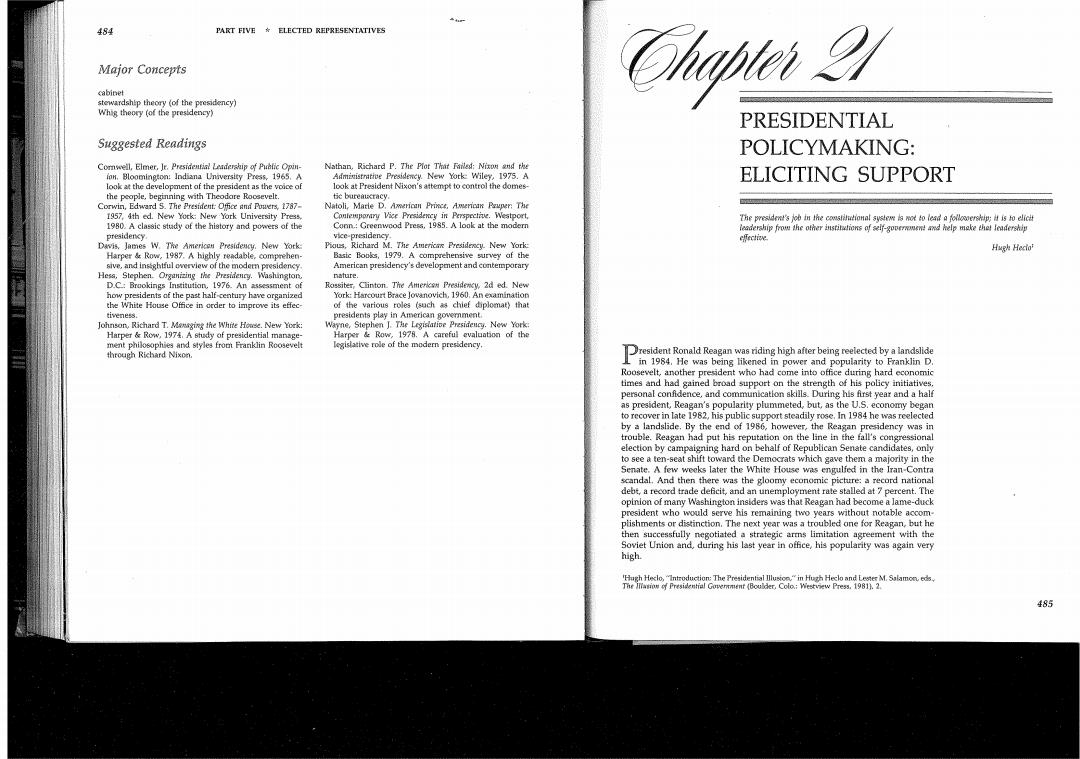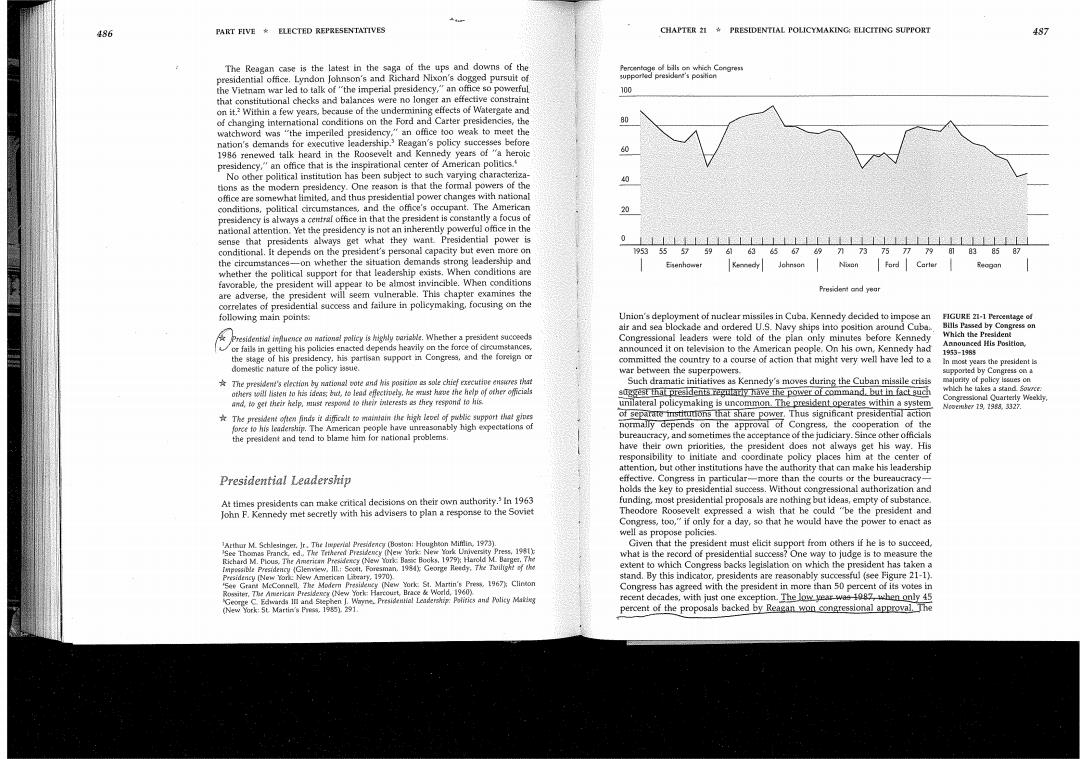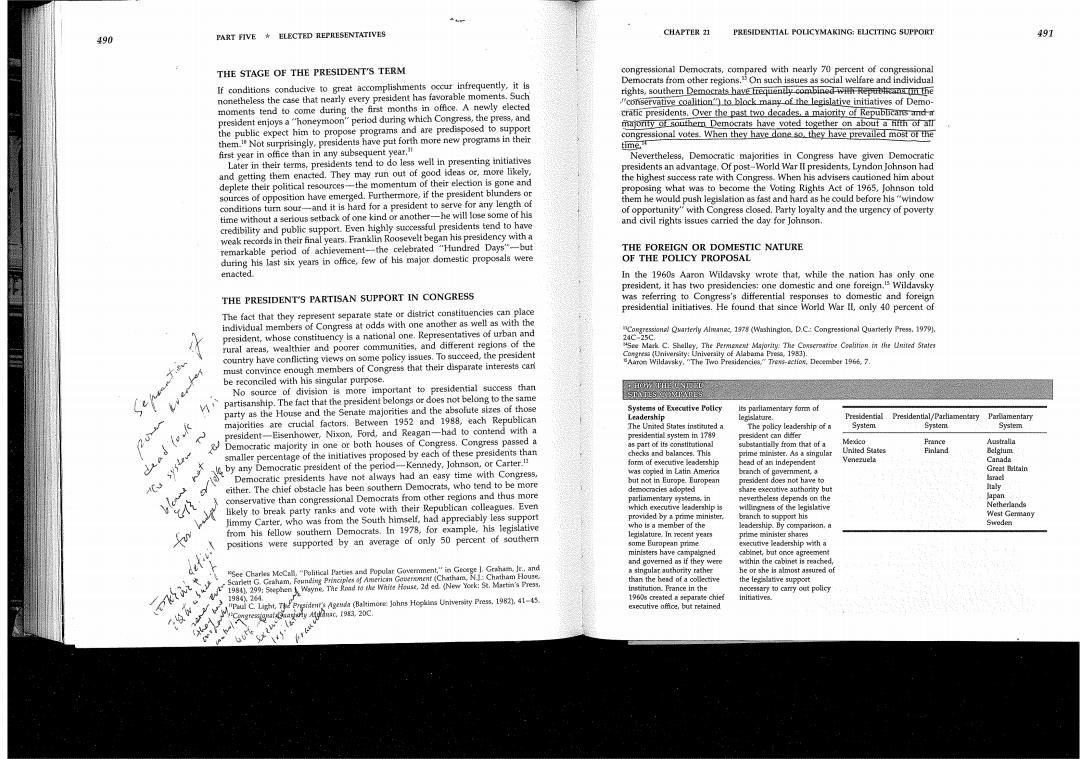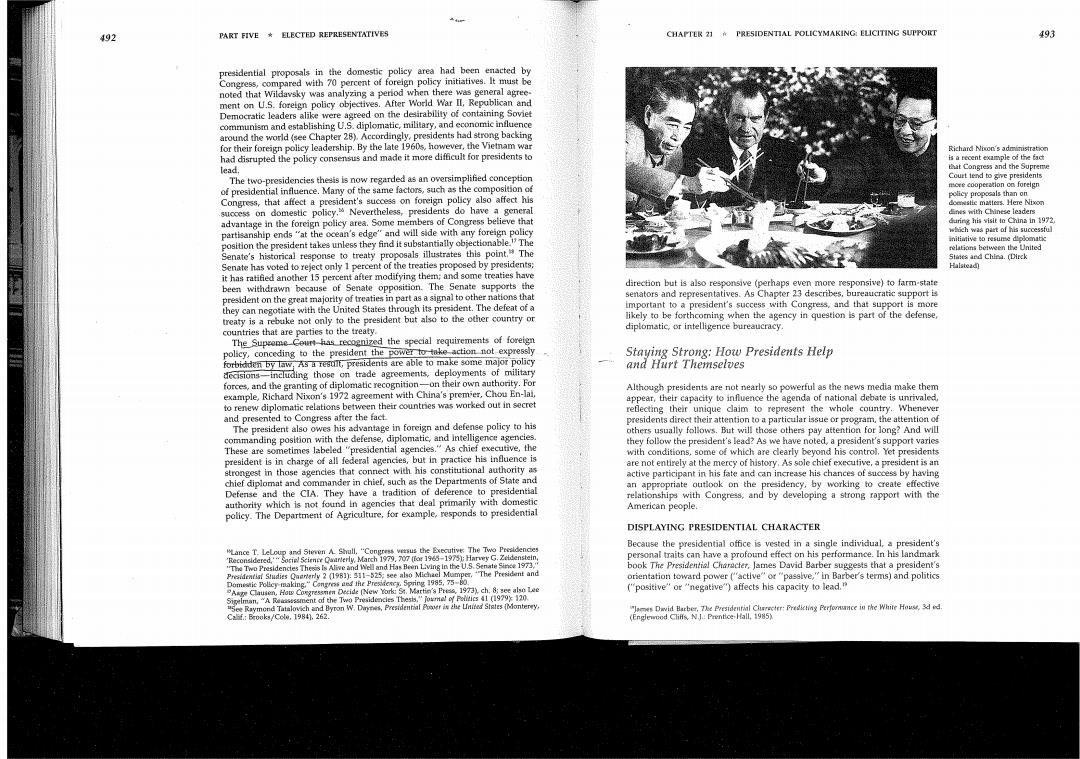
484 PART FIVE ELECTED REPRESENTATIVES Major Concepts Chgn a stewardship theory (of the presidency) Whig theory (of the presidency) PRESIDENTIAL Suggested Readings POLICYMAKING: ion.Bloomington:Indiana University Press,1965.A 职★ ELICITING SUPPORT look at the development of the president as the voice of look at President Nixon's attempt to control the domes- 1957,4th ed.New York:New York University Press Conlewpontry Vice Presidency in Perspective.Westport, ThersdrsbbnhecasionalssrsmtoadafooehwHsntc出 1980.A classic study of the history and powers of the Conn.:Greenwood Press,1985.A look at the modern ice-presider effective. Davis.James W.The Americen Presidency.New York Pious,Richard M.The America Presidency.New York: Hugh Hecto Harper Row,1987.A highly readable,comprehen- Basic Bopks,1979.A comprehensive survey of the American presidency's development and comntemporary Hess,Stephen.Organizing the Presidenry.Washington nature. D.C:Brookings Institution,1976.An assessment of Rossiter,Clinton.The Amerken Preaidency,2d ed.New York:Harcourt Brace Jovanovich,1960.An examination the White Housefce inorder tomprveeff of the various roles (such as chief diplomat)that t1e间28. presidents play in American government. Johnson,Richard T.Monrging the White Howse.New York: Wayne,Stephen J.The Legislatioe Presidency.New York: Harper Row,1974.A study of presidential manage Harper Row,1978. A careful evaluation of the ment philosophies and styles from Franklin Roosevelt legislative role of the modern presidency. through Richard Nixon. resident Ronald Reagan was riding high after being reelected by a landslide in 1984.He was being likened in power and popularity to Franklin D. Roosevelt,another president who had come into office during hard economic times and had gained broad support on the strength of his policy initiatives personal confidence,and communicatlon skills During hisirst year and a half as president,Reagan's popularity plummeted,but,as the U.S.economy began toreoverin late 1982,his public support steadilyoe In 1984he was reelected by a landslide.By the end of 1986,however,the Reagan presidency was in trouble.Reagan had put his reputation on the line in the fall's congressional election by campaigning hard on behalf of Republican Senate candidates,only to see a ten-seat shift toward the Democrats which gave them a majority in the Senate.A few weeks later the White House was engulfed in the Iran-Contra scandal.And then there was the gloomy economic picture:a record national debt,a record trade deficit,and an unemployment rate stalled at 7 percent.The opinion of many Washington insiders was that Reagan had become a lame-duck president who would serve his remaining two years without notable accom- plishments or distinction.The next year was a troubled ane for Reagan,but he then successfully negotiated a strategic arms limitation agreement with the Soviet Union and,during his last year in office,his popularity was again very high. 485

486 PART FIVE ELECTED REPRESENTATIVES CHAPTER 21*PRESIDENTIAL POLICYMAKING:ELICITING SUPPORT 487 The Reagan case is the latest in the saga of the ups and downs of the presidential office.Lyndon Johnson's and Richard Nixon's dogged pursuit of the Vietnam war led to talk of "the imperial presidency,"an office so powerful 100 that constitutional checks and balances were no longer an effective constraint on it.?Within a few years,because of the undermining effects of Watergate and of changing international conditions on the Ford and Carter presidencies,the watchword was "the imperiled presidency "an office too weak to meet the nation's demands for executive leadership.Reagan's policy successes before 1986 renewed talk heard in the Roosevelt and Kennedy years of "a heroic presidency,an office that is the inspirational center of American politics No other political institution has been subject to such varying characteriza- 40 tions as the modern presidency.One reason is that the formal powers of the office are somewhat limited,and thus presidential power changes with national conditions.political circumstances,and the office's occupant.The American 20 presidency is always a office in that the president is constantly a focus of national attention.Yet the presidency is not an inherently powerful office in the sense that presidents always get what they want Presidential power is 0 conditional.It depends on the president's personal capacity but even more on 95355575961636567697刀73757779138587 the circumstances-on whether the situation demands strong leadership and whether the political support for that leadership exists.When conditions are favorable,the president will appear to be almost invincible.When conditions President and yoar are adverse the president will seem vulnerable.This chapter examines the oorrelates of presidential sucoess and failure in policymaking,focusing on the following main points: Union's deployment of nuclear missiles in Cuba.Kennedy decided to impose an FIGURE 21-1 Percentage od air and sea blockade and ordered U.S.Navy ships into position around Cuba. ngress on etung his polcietep mations!policy is highly parle.Whether a president succeeds Congressional leaders were told of the plan only minutes before Kennedy on the force of circumstances. announced it on television to the American people.On his own,Kennedy had the stage of his presidency.his partisan support in Congresa.and the foreign or committed the country to a course of action that might very well have led to a In most years the presidents domestic nature of the policy issue. war between the superpowers. supported by Congress on a The president'selctian by ti oe and his positio s sle that Such dramatic initiatives as Kennedy's moves during the Cuban missile crisis majarity of policy Issues on otherslisten his ideas bu,to lead effectinely.he st haue the help of other ofci suggest that presidents regulaly have the power of command but in fact such which he takes a stand.Sownce. 4md,o8h中h包pmt化doh市i加erests些hey respond to his Congressional Quarterly Weekhy unilateral policymaking is uncommon.The president operates within a system Nooeruber 19,1988.3327. ★The president ofte阴idst师om加the high level可pmbh城support ts!gines of separate istituons that share power.Thus significant presidential action iTheme people have high expectaton of normally depends on the approval of Congress,the cooperation of the the president and tend to blame him for nationai problems. bureaucracy,and sometimes the acceptance of the judiciary.Since other officials have their own priorities,the president does not always get his way.His responsibllity to initiate and coordinate policy places him at the center of attention,but other institutions have the authority that can make his leadership Presidential Leadership eifective.Congress in particular-more than the courts or the bureaucracy- holds the key to presidential success.Without congressional authorization and At times presidents can make critical decisions on their own authority.In 1963 funding,most presidential proposals are nothing but ideas,empty of substance. John F.Kennedy met secretly with his advisers to plan a response to the Soviet Theodore Roosevelt expressed a wish that he could"be the president and Congress,too,"if only for a day,so that he would have the power to enact as well as propose policies. Given that the president must elicit support from others if he is to succeed, what is the record of presidential success?One way to judge is to measure the Richard M.Picus.The Ameritan Presidexcy (New York Ba 0k.1929%Ha0 extent to which Congress backs legislation on which the president has taken a y.1970 stand.By this indicator,presidents are reasonably successful (see Figure 21-1). wYork St.Martin's Press,1967)Clincon La&od1960 Congress has agreed with the president in more than 50 percent of its votes in recent decades,with just ane ption.The low year was 1087,when only 45 (New ork:St Martin's 1)1 percent of the proposals backed by Reagan won congressional approval.The

488 PART FIVE ELECTED REPRESENTATIVES CHAPTER 21 PRESIDENTIAL POLICYMAKING:ELICITING SUPPORT 489 7TpeR76an8aT landmark civil rights and social-welfare leglslation through Congress on the strength of the civil rights movement,the legacy of the assassinated President Kennedy,and large Democratic majorities in the House and Senate.When Reagan assumed the presidency in 1981,high unemployment and inflation had greatly weakened the national economy and created a mood for significant change,which enabled Reagan to persuade Congress to enact some of the moet drastic taxing and spending laws in history. From presidencies such as these has come the popular impression that presidents singlehandedly decide national policy.However,each of these periods of presidential dominance was marked by a special set of circumstances: a decisive election victory that gave added force to the president's leadership,a compelling national problem that convinced Congress and the public that bold presidential action was needed,and a president who was mindful of Congness in 1965.jobn had what was expected and who vigorously advocated policies consistent with those expectations. wilh Congnss,which When conditions are favorable,the power of the presidency appears awe- adopted the grat majority of his some.The problem for most presldents is that conditions are not normally legislative peoposal.(Rene Burri/Magum) conducive to strong leadership.Erwin Hargrove suggests that presidential intluence depends largely on circu mstance.Some presidents serve in periods. when important prblems are surfacing in American society but have not yet become critical Such a situation,Hargrove contends,produces a"president of previous low had occurred in 1973,during the Watergate crisis,when Congress preparation,"who opens the way for major pollcy changes but is no longer in agreed with Nixon only on slightly more than half of legislative issues.The high office by the time the change is made.Kennedy was one such president;he point of presidential-congressional agreement was 1965.when Lyndon recognized that federal intervention would be necessary to bring social justice to Johnson's positions coincided with Congress's votes in 93 percent of cases. black Americans,but because conditions were unfavorable,he could not get A lougher fest of presidential success is the proportion of White House Congress to act.The legislation was passed after his death,when Lyndon initiatives that are enacted by Congress.It is one thing for a president to takea Johnson was president.Johnson is an example of what Hargrove calls a stand on a bill that is already before Congress,but quite another thing for the president of achievement."Such a president is likefy to have an activist vlew of ANALYZE THE LSSLE president to proposal and then see i into his office,but a more crucial factor is that he serves at a time when other leaders Presidential Greatness law.No president has come close to getting enactment of all the programs that and the public are generally agreed on a compelling issue,such as the need for he placed before Congress.The average sucess rate is just below0 percent,but civil rights legislation.This climate of opinion enables the president,if he seizes there has been wide variation."Johnson saw 69 percent of his 1965 initiatives the moment,to achleve great success.Finally,there is the "president of enacted,whereas Nixon attained only 20 percent in 1973.Moreover,presidents consolidation,"who by personal inclination and circumstance solidifies past have had markedly less success on their more ambitious proposals than on achievements.One such president was Dwight D.Eisenhower,who proposed Aeishcu not expect few innovative policies of his own but did consolidate the policy changes too much from him because Whether a president's initiatives are likely to succeed or fail depends on accomplished two decades earlier under Franklin Roosevelt,a president of the mountainous bdget several factors,including the force of circumstance,the stage of the president's deficits precuded most policy term,the president's partisan support in Congress,and the foreign or domestic Of course,presidents have some control over their fate.Through effective initiatives.Do the times ictate th时Bash will be less nature of the policy proposal.Let us examine ch of these factors. leadership they can sometimes rally the public and Congress behind goals that they believe are important.In general,however,presidential achievement is heavily dependent on circumstance.Had Franklin Roosevelt been elected in bout the THE FORCE OF CIRCUMSTANCE 1960 rather than 1932,his place in American history would be very different During his first months in office and in the midst of the Great Depression. and probably much less conspicuous.Roosevelt's genius lay in the devlsing of Franklin D.Roosevelt accomplished the most sweeping changes in domestic extraordinary policies,not in the creation of conditions that led to their acceptance. Coegressiang!Qurtery Alnaudr,1983 (Washington,D.C:Congressioeal Qaarterly Preas,1984) 41- 57 Erwin Hargrove.The Poere Modern Presdency (New Yarc Knopl,1974)

PART FIVE ELECTED REPRESENTATIVES CHAPTER2力 PRBSIDENTIAL POLICYMAKING:ELICITING SUPPORT 491 490 THE STAGE OF THE PRESIDENT'S TERM congressional Democrats,compared with nearly 70 percent of congressional If conditions conducive to great accomplishments occur infrequently,it is Democrats from other regions.On suchissuesas soca welfare and individual nonetheless the case that nearly every president has favorable moments.Such rights,souther Democrats have frequently combinedwepThe moments tend to come during the first months in offce.A newly elected "conservative coalition to block many of the legislative initiatives of Demo president enjoys a"honeyperiod during which Congress,the press,and crafic presidents.Over the past two decades,a majority of Republicares ad a of southemn Democrats have voted together on about a fifth of all the public expect him to propose programs and are predisposed to support congressional votes.When they have done so they have prevailed most of the them Not surprisingly,presidents have put forth more new programs in their ime, first year in office than in any subsequent year. Later in their terms,presidents tend to do less well in presenting initiatives Nevertheless,Democratic majorities in Congress have given Democratic and getting them enacted.They may run out of good ideas or,more likely, presidents an advantage.Of post-World War lI presidents,Lyndon Johnson had deplete their political resources-the momentum of their election is gone and the highest success rate with Congress.When his advisers cautioned him about sources of opposition have emerged.Furthermore,if the president blundersor proposing what was to become the Vating Rights Act of 1965,Johnson told them he would push legislation as fast and hard as he could before his"window conditions turn sour-and it is hard for a president to serve for any length of time without a serlous setback of one kind or another-he will lose some of his of opportunity"with Congress closed.Party loyalty and the urgency of poverty credibility and public support.Even highly suocessful presidents tend to have and civil rights issues carried the day for Johnson. weak records in their final years.Franklin Roosevelt began his presidency with a remarkable period of achievement-the celebrated "Hundred Days"-but THE FOREIGN OR DOMESTIC NATURE during his last six years in office,few of his major domestic proposals were OF THE POLICY PROPOSAL enacted In the 1960s Aaron Wildavsky wrote that,while the nation has only one president,it has two presidencies:one domestic and one foreign.Wildavsky THE PRESIDENTS PARTISAN SUPPORT IN CONGRESS was referring to Congress's differential responses to domestic and foreign The fact that they represent separate state or district constituencies can place presidential initiatives.He found that since World War Il,only 40 percent of individual members of Congress at odds with one another as well as with the Ca president,whose constituency is a national one.Representatives of urban and rural areas,wealthier and poorer communities,and different regions of the See Mark C.Shelloy.The Permgxe!Msfority:The Coserortive Coalition.in the United Srates country have conflicting views on some policy issues.To succeed,the president must convince enough members of Congress that their disparate interests can be reconciled with his singular purpose. No source of division is more important to presidential success than HOW THE LNIEC partisanship.The fact that the president belongsodoes not belong to the same party as the House and the Senate majorities and the absolute sizes of those ma i otities are crucial factors.Between 1952 and 1988,each Republican Leadership president-Eisenthower,Nixon,Ford,and Reagan-had to contend with a The States instu a System System presidential system in 1789 Democratic majority in one or both houses of Congress Congress passed a as part of its constitutional u止antially from that of a smaller percentage of the initiatives proposed by each of these presidents than checks and balances.This oaime mirvster.As a singular form of executive leadership head of an independent Venezuela De Democratic president of the period-Kennedy,Johnson,o Democratic presidents have not always had an easy time with Congress, was oopied atin America either.The chief obetacle has been southern Democrats,who tend to be more but in Europe European 12y conervative than congressional Democrats from other regions and thus more in apan likely to break party ranks and vote with their Republican colleagues.Even Jimmy Carter,who was from the South himself,had appreciably less support West Germany Swede from his fellow southern Democrats.In 1978,for example,his legislative average of only 50 peroent of southern legislature.In recent years positions were supported by an some European prime executtve leedership with a mintsters have camna gned cabinet.but ooce agreemer and governed as if they were within the cabinet is reached. See Charles McCan,"Political a singulat authority tather he or she is almost assured of 198, The Road ro the White Hause,2d ed (New Yoek:Martin's Press institution France in the ight.Th nimr's Agend (Baltimore johns Hopes Untversity Press.1982).41-45 r.193.20C

492 PART FIVE ELECTED REPRESENTATIVES CHAPTER 21 PRESIDENTIAL POLICYMAKING:ELICITING SUPPORT 493 presidential proposals in the domestic policy area had been enaeted by ht Wyn ment on U.S.foreign policy objectives.After World War IL,Republican and Democratic leaders alike were agreed on the desirability of containing Soviet communism and establishing U.S.diplomatic,military,and economic influence around the world (see Chapter 28).Accordingly,presidents had strong backing for their foreign policy leadership.By the late 1960s,however,the Vietnam war Richard nicon's admmistraboe had disrupted the policy consensus and made it more difficult for presidents to lead. The two-presidencies thesis is now regarded as an oversimplified conception id of presidential influence.Many of the same factors,suchas the compositonof policy propocals than on Congress,that affect a president's sucoess on foreign policy also affect his Soewestle matteas.Here Ntxon success on domestic policy.Nevertheless,presidents do have a general nes with Chinese leaders advantage in the foreign policy area.Some me nbers of Congress believe that during his visit to China in 1972 partisanship ends "at the ocean's edge"and will side with any foreign policy which was part af his successful position the president takes unless they find it substantially objectionableThe relations between the United Senate's historical response to treaty proposals illustrates this point.The Stadtes and China.(Dirck Senate has voted to reject only 1 percent of the treaties proposed by presidents; it has ratified another 15 percent after modifying them;and some treaties have been withdrawn because of Senate opposition.The Senate supports the direction but is also responsive (perhaps even more responsive)to farm-state president on the great majority of treaties in part as a signal toothernations that senators and representatives.As Chapter 23 describes,bureaucratic support is they can negotiate with the United States through its president.The defeat of a important to a president's success with Congress,and that support is more treaty is a rebuke not only to the president but also to the other country or likely to be forthcoming when the agency in question is part of the defense, countries that are parties to the treaty. diplomatic,or intelligence bureaucracy The Supeeme-Ceurt-has recognized the special requirements of foreign policy,conceding to the president the power to-take-action not expressly Staying Strong:How Presidents Help forbidd 1 by law Ase presidents are able to make some major policy and Hurt Themselves decisoninding those on trade agreements,deployments of military forces and the granting of diplomatic recognition-on their own authority.For Although presidents are not nearly so powerful as the news media make them example,Richard Nixon's 1972 agreement with China's premier,Chou En-lai, to renew diplomatic relations between their countries was worked out in secret appear,their capacity to infuence the agenda of national debate isunrivaled, refecting their unique claim to represent the whole country.Whenever and presented to Congress after the fact The president also owes his advantage in foreign and defense policy to his presidents direct their attention to a particular issue or program,the attention of others usually follows.But will those others pay attention for long?And will commanding position with the defense,diplomatic,and intelligence agencies. they follow the president's lead?As we have noted,a president's support varies These are som etimes labeled oresidential agencies."As chief executive,the president is in charge of all federal agences,but in practice hisinuence is with conditions,some of which are clearly beyond his control.Yet presidents strongest in thase agencies that connect with his constitutional authority as are not entirely at the mercy of history.As sole chief executive,a president is an active participant in his fate and can increase his chances of success by having chief diplomat and commander in chief,such as the Departments of State and Defense and the CIA.They have a tradition of deference to presidential an appropriate outook on the presidency.by working to create effective relationships with Congress,and by developing a strong rapport with the authority which is not found in agencies that deal primarily with domestic policy.The Department of Agriculture,for example,responds to presidential American people. DISPLAYING PRESIDENTIAL CHARACTER Because the presidential office is vested in a single individual,a president's personal traits can have a profound effect on his performance.In his landmark Living in the U.S at地sne1973, book Thre Presidential Character,James David Barber suggests that a president's also Michael Mumper.The President and 5pirg1985,7-0 orientation toward power("active"or "passive,"in Barber's terms)and politics %19ch8 Lee ("positive"or"negative")affects his capacity to lead. Jmes Dwvid Barber,The Presidential Chn .:Brooks/Colo.19841.262. (Englewood Cliffs N.J.:Prentioe-Hall,1985)